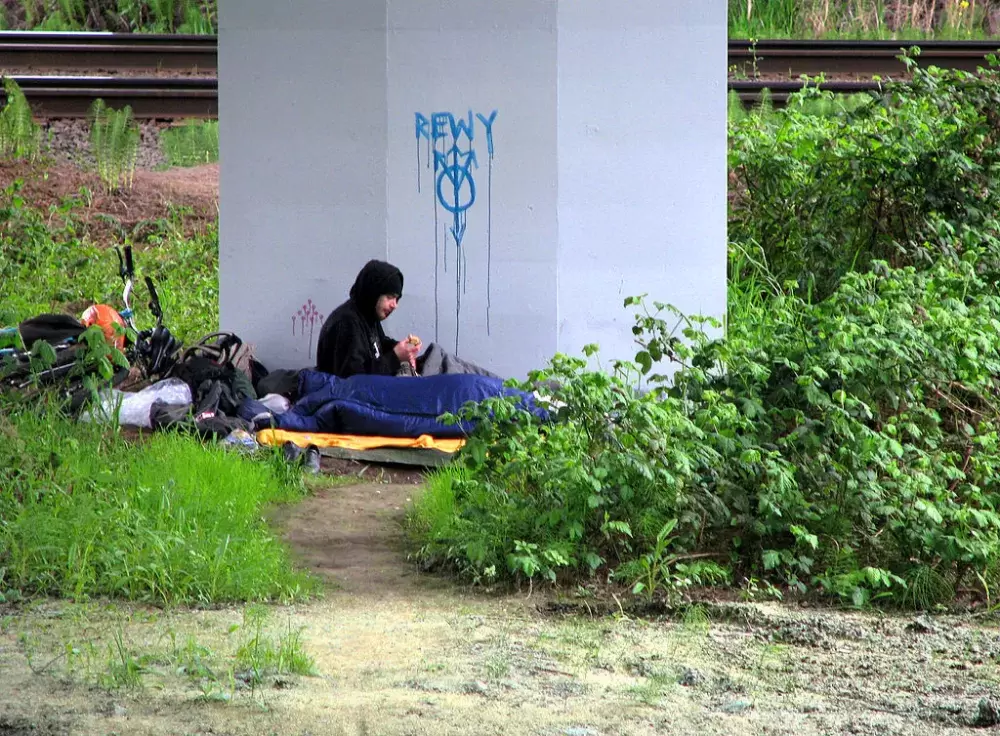“Intergenerational trauma, cultural genocide, racism and discrimination” are being blamed for the disproportionate number of indigenous people among Canada’s homeless, according to a recently released publication on the issue.
The Definition of Indigenous Homelessness in Canada is the most recent effort to pinpoint the national trend. Released by the Canadian Observatory on Homelessness, a national research institute, the document was created in consultation with aboriginal scholars, elders, front-line social service workers and community members to better define why so many indigenous people in Canada find themselves without housing.
The document cites various studies from scholars across the country, including one by University of Lethbridge researchers indicating that indigenous peoples are up to eight times more likely to be homeless in urban centres than the general population. According to Statistics Canada, aboriginal people account for just 0.5 per cent of Toronto’s population, yet this group makes up 15 per cent of the homeless in Canada’s largest city. This proportion increases to 50-70 per cent in Thunder Bay and Winnipeg, as reported by the CBC, while in Whitehorse, Yukon, 90 per cent of the homeless are aboriginal, according to another academic study on the issue referenced in the COH document.
Amid such statistics, the Canadian Observatory on Homelessness argues “chronic underfunding” from governments have failed to improve a problem caused by generations of “cultural destabilization.” Indigenous homelessness is a multi-dimensional issue complicated by the historic displacement of aboriginal communities, spiritual disconnection, cultural disintegration and mental disruption “caused by colonialism’s entrenched social and economic marginalization of indigenous peoples,” states the COH document.
Due to the transient nature of those affected, the true scope of homelessness can be difficult to define in a community. On Nov. 22, 2016 the Alberni Valley Community Stakeholders to End Homelessness held a count in an effort to better understand the extent of the problem in Port Alberni. Over a period of 17 hours, 32 volunteers surveyed 73 individuals without stable housing – 71 per cent of whom identified aboriginal heritage. Three quarters of respondents didn’t have a permanent residence to return to that night, while others were in unstable apartment situations or temporarily living with family. Almost 70 per cent of those surveyed were on income assistance or disability benefits.
While the 2016 homeless count was conducted to get a snapshot of the local issue, Wes Hewitt, executive director of the Port Alberni Shelter Society, believes the number of people in the community without housing is significantly greater than what the one-day survey identified. The society’s 14 emergency shelter beds are always full, said Hewitt, causing multiple daily instances of being unable to accommodate people.
“We’re constantly turning people away to the point of between 900 and 1,000 turnaways a year,” he said.
The society also runs a sobering site with Island Health, where demand exceeds what is available.
“The intention of the sobering site is to take pressure off of the emergency room, to relieve pressure from the RCMP themselves and emergency services,” said Hewitt. “It was funded with a contract for two beds, but it’s been running over capacity as well.”
Hewitt estimates that 30-40 per cent of the shelter’s clients are indigenous, a larger proportion than Statistics Canada data that indicates 13.4 per cent of the Alberni Valley is aboriginal. Many of the shelter’s clients come to Port Alberni from west coast communities seeking services or opportunity in the small city.
“It may be for health services, it may be because of issues within their own community - they’re forced to leave and this is the closest centre of any size,” said Hewitt. “This is the first real spot that they might have a chance, because there’s no housing in Tofino…Ucluelet is just as bad.”
With funding from BC Housing, the Canadian Mental Health Association’s Homeless Outreach Program works to help those without housing or who are at risk of losing their shelter. The chapter serving Port Alberni and Vancouver Island’s west coast communities has worked with 221 clients since April 1, including 66 – of less than one third – who are First Nations.
The major trend that CMHA outreach worker Mark Cairney has seen is a decline in affordable housing.
“That is our biggest struggle,” he said. “Everything else seems to be pretty stable. We don’t see more people leaving reserve, for instance. We don’t seem to see a whole lot more people moving around.”
In recent years the inability to afford housing has become the leading cause for homelessness, added Hewitt.
“Up until about 2009 mental health and substance abuse was biggest cause of homelessness,” he said. “It’s been the situation (recently) that poverty is the leading cause.”
The local front-line workers have seen an increase in the number of seniors struggling with housing.
“I’ve got three people right now in wheelchairs who we can’t find places for,” noted Cairney of his older clients.
The oldest person served by the Port Alberni Shelter Society last year was 82.
“No addiction issues, no mental health issues, just poverty,” said Hewitt of the client. “What’s somebody that age doing in a shelter?”







